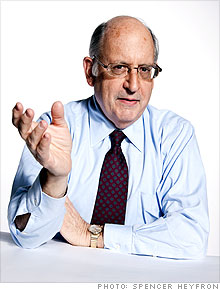Search News
FORTUNE -- One of the great misconceptions in this country is that what happens in Washington determines what happens in financial markets. It's so simple, convenient, and satisfying to attribute market movements to the President, the Federal Reserve, Congress, the tax code, or some combination of them. It sure makes for great sound bites and slogans -- but often makes for inaccurate analysis.
That brings us to today's hot topic in our nation's capital: taxes. Specifically, whether to let the Bush tax cuts lapse on Jan. 1, which would make tax rates higher than now. The issue has produced so much hot air that we'd be well on our way to becoming a green nation if only we could harness it to create electricity. Alas, we can't.

One of the areas where letting the cuts lapse would have the biggest impact is taxes on investment income, much of which goes to a relative handful of very-high-income people. Under President Obama's plan, dividends for "the rich" would be taxed at the same rate as long-term capital gains, which will be 20%, rising later to 23.8%, up from the current 15%.
Dire predictions abound. History suggests, however, that while the top tax rate on investment income may be a factor driving financial markets, it isn't the factor. A case in point: the 2003 tax cut. It set dividend taxes for the high-bracket crowd at preferential rates for the first time and brought the rate on long-term capital gains to its lowest point since 1941, according to CCH.
However, that didn't exactly result in a bull market. According to Wilshire Associates, whose numbers I'm using throughout this article, the U.S. stock market rose only 14.6% from the May 5, 2003, tax cut through Obama's election on Nov. 4, 2008. I picked Election Day because Obama ran on a higher-tax platform. That price gain, about 2.5% a year compounded, was less than half the historical rate.
Since Obama's election, the market has been very good. In fact, the market's 10.4% rise during Obama's first 100 days in office bested tax-cutting Ronald Reagan (a 4% gain for his first 100 days) and George W. Bush (a 2.3% loss for the equivalent period).
Now, before you start your e-mail and blog rants, take a deep breath. And remember the point of this column is the folly of attributing everything to Washington.
Bush 43, during whose administration the market lost 34%, took office just before the Internet stock bubble burst and left in the midst of a market-destroying financial panic. Thus, stocks were artificially high when he assumed office and artificially low when he left. It makes no sense to attribute the market's losses to his tax policy.
Similarly, it's silly to attribute the gains of more than 40% since Obama's election to Obama. It also made no sense to attribute the losses between his election and the market bottom in March 2009 to him, although many people did.
You also can't attribute the strong market during the Clinton years -- up 189%, compared with 107% for the Gipper's years -- to the tax increases he pushed through. The market rose because the economy was booming, jobs were plentiful, and stocks entered bubble territory. Was that because tax rates rose? I tend to doubt it.
It's possible that higher rates on investment income kept stocks lower than they'd otherwise have been, and lower rates kept them higher. But someone would need to prove that to me -- and I'm not sure it's provable.
So let's try to act like adults when we talk about taxes on investment income, rather than deifying or demonizing Washington. I don't want to pay higher taxes, especially on my investment income. Who does? But I don't think that the world will end -- or that my investment portfolio will be vaporized -- if rates on investment income rise.
From the start of the income tax through 2003, dividends were taxed as regular income, and capital gains were treated far less favorably than now. Somehow both the Republic and the financial markets survived. They'll survive higher rates too.
Update: An earlier version of this story incorrectly stated that under President Obama's plan, dividends for "the rich" would be taxed at the same rate as ordinary income, with a maximum rate of 39.6%. That would happen if Bush's tax cuts are allowed to expire, but it's not what Obama is proposing. I apologize for the error. ![]()






| Company | Price | Change | % Change |
|---|---|---|---|
| Ford Motor Co | 8.29 | 0.05 | 0.61% |
| Advanced Micro Devic... | 54.59 | 0.70 | 1.30% |
| Cisco Systems Inc | 47.49 | -2.44 | -4.89% |
| General Electric Co | 13.00 | -0.16 | -1.22% |
| Kraft Heinz Co | 27.84 | -2.20 | -7.32% |
| Index | Last | Change | % Change |
|---|---|---|---|
| Dow | 32,627.97 | -234.33 | -0.71% |
| Nasdaq | 13,215.24 | 99.07 | 0.76% |
| S&P 500 | 3,913.10 | -2.36 | -0.06% |
| Treasuries | 1.73 | 0.00 | 0.12% |
|
Bankrupt toy retailer tells bankruptcy court it is looking at possibly reviving the Toys 'R' Us and Babies 'R' Us brands. More |
Land O'Lakes CEO Beth Ford charts her career path, from her first job to becoming the first openly gay CEO at a Fortune 500 company in an interview with CNN's Boss Files. More |
Honda and General Motors are creating a new generation of fully autonomous vehicles. More |
In 1998, Ntsiki Biyela won a scholarship to study wine making. Now she's about to launch her own brand. More |
Whether you hedge inflation or look for a return that outpaces inflation, here's how to prepare. More |